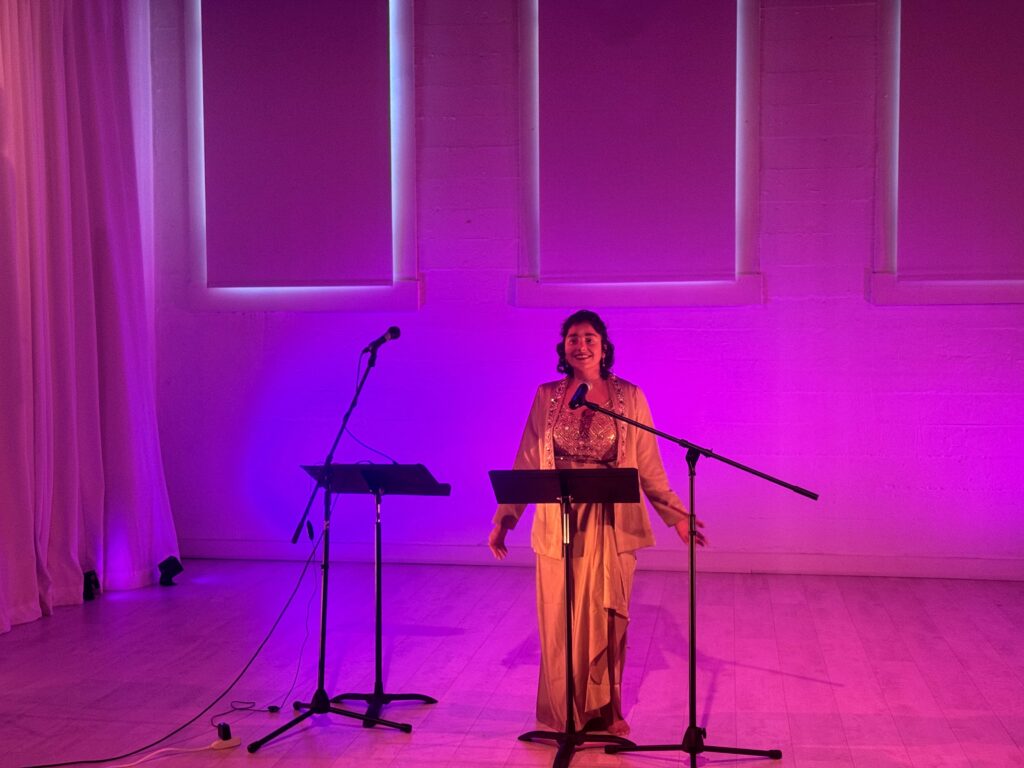By: Yasmin Hassan, Staff Writer
On an unassuming street in Vancouver, I found myself at Morrow, a hidden art studio. I went in on a Wednesday just to check the gallery out, but little did I know, I’d stumbled into the studio mid-rehearsal. Despite the fact that I walked in unannounced and uninvited, I had never felt more welcome in a space.
Ziyian Kwan, the artistic director for Morrow, Odd Meridian Arts, and producer for ahmm (Asian Heritage Month at Morrow), says “ahmm invites rupture, nurture, defiance, and bows in deep reverence, to all things queer. It’s a spirited and gently subversive multidisciplinary affair, including performances, workshops, and a gallery exhibit. A month of creative offerings that cultivate non-linear spaces of past, present, and future heritage.”
I had the privilege of seeing Ajeeb Ajeeb, a mixture of spoken word, sound, song, and movement, performed by incredible local artists Nhylar, Anjalica Solomon, and Panthea Vatandoost. Nhylar is a queer gender non-conforming storyteller, media artist, and poet born in India who is active in events such as VancouverPride and Queer Arts Festival. Anjalica is a genderfluid Desi musician, songwriter, poet, spoken word artist, and multidisciplinary performer based in Vancouver whose poetic work “seeks to proclaim the possibilities of love and resilience.” Panthea is an Iranian actor, director, creator, and founder of managing artistic director of Medusa Theatre Society, a non-profit devoted to “supporting and producing works that engage with the immigrant and refugee community, with a focus on the Middle East.”
Ajeeb, in Farsi, Urdu, and Hindi, means “strange, odd, familiar, and wonderful,” which perfectly describes the sensations that emanated from this performance; it felt like an exploration of life, a culmination of the experiences of the artists being a part of the Asian diaspora and feeling out of place.
The show started off with Solomon reading a poem, with the sounds of her voice being loop-peddled by an Rc505 loop station, creating an immersive sonic soundscape. After the opening poem, Nhylar began their segment of the show with a ritual, bridging the ceremony with the performance. The ritual felt like an immersive, interactive experience, making everyone in the space in some way whole and present.

Nhylar, after finishing their beautiful ritual, began reading out their poems. These poems ranged from various themes and experiences like alien and human duality, queer eroticism, appreciating nature, questioning life, grief, and death. I couldn’t help but think that the idea of returning to nature reminded me of pastoral poetry, which I wholeheartedly enjoy.
Next came Solomon, returning to read her poetry. She opened up with a poem called “Brown Girl Smoking Up,” which stunned me. Her poems touched on being far from home or never being able to return, meeting her mother for the first time, queerness, and climate change. Not only was she reciting her spoken word, but she also sang and used the loop-peddling, which truly drove it home for me; she has an commanding voice!
Finally, the last act of the show was from Panthea Vatandoost, who started off by handing out party hats to the audience. Hearing her say, “Welcome to my funeral party!” told me I was in for something amazing. Her performance was less poetry and more a conversation or a phone call with an old friend. As she moved around the room, Vatandoost talked about a range of topics — her grandma’s hands, death and its untimeliness, the idea of having an unfulfilled prophecy and bearing the weight of a legacy, and an endless cycle of indentured servitude. She finished her set with dancing and singing, looking ethereal.
The gallery itself was adorned with beautiful and intricate installations like a tea ceremony table, a shelf for different Asian snacks, a couple of shelves for selling handmade goods (cards, books, keychains, stickers, and more), and one installation that particularly caught my eye. This mixed media installation by Sauha Lee is titled “Your Intentions Walk Towards You,” and it explores “the way she confronts her heritage and ancestry.” The combination of different objects collected over time takes the form of a sort of shrine, with a big mix of melted candle ends sitting in the middle. Beneath lies three intention-holding weights, from which you write an intention down on paper and place it underneath one of the weights. If you have a chance, do not skip out on seeing a show at Morrow. Despite its small, intimate space, Morrow isn’t afraid to explore and expose the ajeeb in and of life!